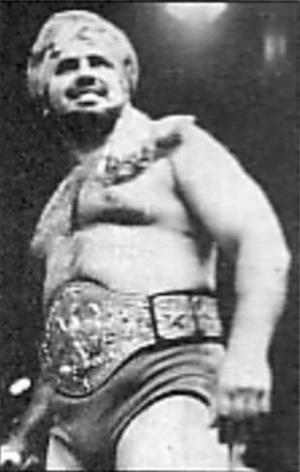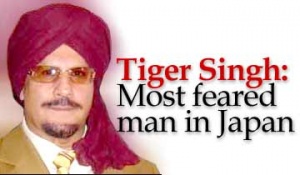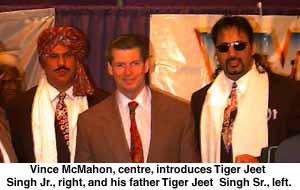Jagjit Singh Hans
Jagjit Singh Hans (born 1944 in Ludhiana, Punjab, India) is a semi-retired professional wrestler, known better by his ring name Tiger Jeet Singh.
His father was a major in the Indian army. In 1965, at the age of 21, he emigrated to Toronto, arriving with $6 in his pocket. Soon after, Hans drifted into professional wrestling, eventually signing with Frank Tunney, a Toronto wrestling promoter. Tunney introduced him to Fred Atkins, a trainer and conditioning coach with the Toronto Maple Leafs, who dubbed Hans "Tiger" after witnessing his ferocious, no-holds-barred style of fighting. The name and his volatility proved immensely popular among wrestling fans.
Tiger fought on the Canadian and U.S. wrestling circuits, grappling with opponents like Sweet Daddy Siki, Andre the Giant, Hans Schmidt, Whipper Billy Watson and "Bulldog" Dick Brower. Retired wrestler Ron Doner, who often teamed with Schmidt, remembers the Tiger as a fan favorite because of his magnetism in the ring. "He created much more excitement than most other wrestlers would," says Doner.
During the 1970s, Tiger became one of Canada's top-billed and most recognizable wrestlers, earning up to $80,000 a year, usually wrestling at Maple Leaf Gardens. But he was not satisified, especially when he realized how much money he could make in Japan.
He made a name for himself in Japan while visiting the country in 1972. He got into a brawl with the bodyguards of Antonio Inoki's wife by slapping her in the face in a shopping centre. The resulting publicity propelled Tiger into the limelight. He returned to Japan to beat Inoki in the ring, becoming infamous in a land where professional wrestling is the third-most-popular sport behind baseball and sumo wrestling. Nowadays, he spends three months a year fighting in Asia.
Tiger Jeet Singh wrestled in Japan for 22 years, the longest of any foreigner in Japan, mostly as a freelancer. He was the first pro wrestler in Japan to defeat 14-time sumo grand champion Wajima. Tiger is worshipped and loved in Japan. In Japan it is considered an honor to be hit by Tiger Jeet Singh. He explains, “If I slap some Japanese lady or man, they won’t wash themselves for weeks. Because they’ll say, ‘Tiger slapped me there.’ This is the respect they have for me."
Tiger Jeet Singh has enjoyed a fantastic nearly 40 year wrestling career. Since his debut in 1965, Singh has become the most successful Punjabi pro wrestler in history and one of the top 100 draws of all time. His feud with Antonio Inoki and his crazy antics have sold out numerous arenas worldwide. He has held many championships including: The AJPW International Tag Title, UWA Heavyweight, and FMW World Title. Tiger has also been voted most successful foreigner multiple times by the Japanese wrestling press and was named "Heel of the Century" in 2000. Singh now spends his time doing charitible works in both Canada and India, wrestling on occasion, and is trying to start up his own Indian based promotion World Wrestling Mania.
Tiger Jeet Singh wrestled as a crazed heel, and used the cobra (sleeper) as his finisher.
Tiger is a prominent member of Metro Toronto's Sikh community.
In January 1997, his son Mick, better known now as Tiger Jeet Singh Jr. or Tiger Ali Singh, joined the WWF.
Professional career
Made his Maple Leaf Gardens debut in 1965, wrestling as a heel. His first main event in Toronto was a tag match late that year, teaming with Professor Hiro to take on the team of Johnny Powers and Sweet Daddy Siki. Began teaming with Fred Atkins in 1966. Became the top team in Toronto by defeating Whipper Billy Watson and Bulldog Brower for the international tag title in July 1966. Singh and Atkins wrestled at or near the top of the card through 1966 and 1967.
Made his solo debut in a Maple Leaf Gardens main event in April 1967, defeating the Mighty Igor.
Defeated Johnny Valentine for the Toronto version of the U.S. title the following month. Wrestled Gene Kiniski for the NWA title in the summer of 1967 and, in the fall, twice challenged Bruno Sammartino for the WWWF title. With Wild Bull Curry, again defeated Watson and Brower to win the international tag title in 1968. Turned babyface late in 1968.
In February 1971, wrestled The Sheik in the main event of the first wrestling show in Maple Leaf Gardens history to attract a sell-out crowd of over 18,000 (there had been sell-outs before, but more seats had since been crammed into the Gardens to allow a capacity crowd of 18,000). Wrestled The Sheik 12 times at the Gardens from 1971-1974. I think it's fair to say that Singh learned a lot from Sheik, since his wildman persona in Japan, Australia, and most areas of the world outside of Toronto was very similar to Sheik.
Won the IWA tag title in Australia in 1971 with Mr. Fuji, defeating Mark Lewin & King Curtis Iaukea. Began wrestling in Japan in 1973, arriving with a bang by attacking Antonio Inoki outside a Tokyo department store in October. Inoki got even by "breaking Singh's arm" in a 1974 match. Defeated Inoki to win the NWF world title in 1975. Lost the belt to Inoki three months later.
Defeated Seiji Sakaguchi in 1976 to win the NWF Asian title and remained champion until jumping to All Japan in mid-1981. Wrestled in the main event of the joint New Japan-All Japan card in Tokyo in 1978, teaming with Abdullah the Butcher to take on the Japanese dream team of Inoki & Giant Baba.
Defeated El Canek to win the UWA heavyweight title in Mexico in 1980. Lost the title to Inoki a couple months later, regained it, and then dropped it back to Canek in 1981. Back in Toronto, had one final match for Frank Tunney against Sheik in 1977 when he subbed for no-show Dusty Rhodes. Defeated Ric Flair in Toronto in 1979 and, in the same year, challenged Nick Bockwinkel for the AWA title at the Gardens. Made his final Gardens appearance for Tunney in 1983.
Continued to wrestle in Japan in the 1980s and 1990s, and would make occasional appearances on indie shows in the Toronto area. In 1990, teamed with Inoki to defeat Big Van Vader & Animal Hamaguchi in the main event of Inoki's 30th anniversary show in Yokohama. Feuded with Atsushi Onita in FMW in 1992. Wrestled in the main event of the first Heisei Ishingun card in Tokyo in 1994, losing to Shiro Koshinaka with Inoki as referee. Tiger Jeet Singh still wrestles to this day, trains hard everyday, and makes apprences in wrestling events in Canada, and Japan.
Championships and accomplishments
All Japan Pro Wrestling
- 1-time AJPW All Asia Heavyweight Champion
- 1-time NWA International Tag Team Champion (with Umanosuke Ueda)
International Wrestling Alliance
- 1-time IWA Tag Team Champion (with Mr. Fuji)
- International Wrestling Association
- 1-time IWA International Heavyweight Champion
- National Wrestling Alliance
- 1-time NWA Canadian Tag Team Champion (Vancouver version) (with Dennis Stamp)
- 2-time NWA International Tag Team Champion (Toronto version) (with Fred Atkins and Bull Curry)
- 1-time NWA North American Tag Team Champion (Los Angeles/Japan version) (with Umanosuke Ueda)
- 1-time NWA United States Heavyweight Champion (Toronto version)
New Japan Pro Wrestling (National Wrestling Federation titles)
- 1-time NWF Heavyweight Champion
- 1-time NWF North American Heavyweight Champion
- 1-time NWF North American Tag Team Champion (with Umanosuke Ueda)
Universal Wrestling Association
- 2-time UWA World Heavyweight Champion
World Wrestling Association
- 1-time WWA World Martial Arts Champion
Finishing Moves
Special Moves
Sleeper Hold
Camel clutch



